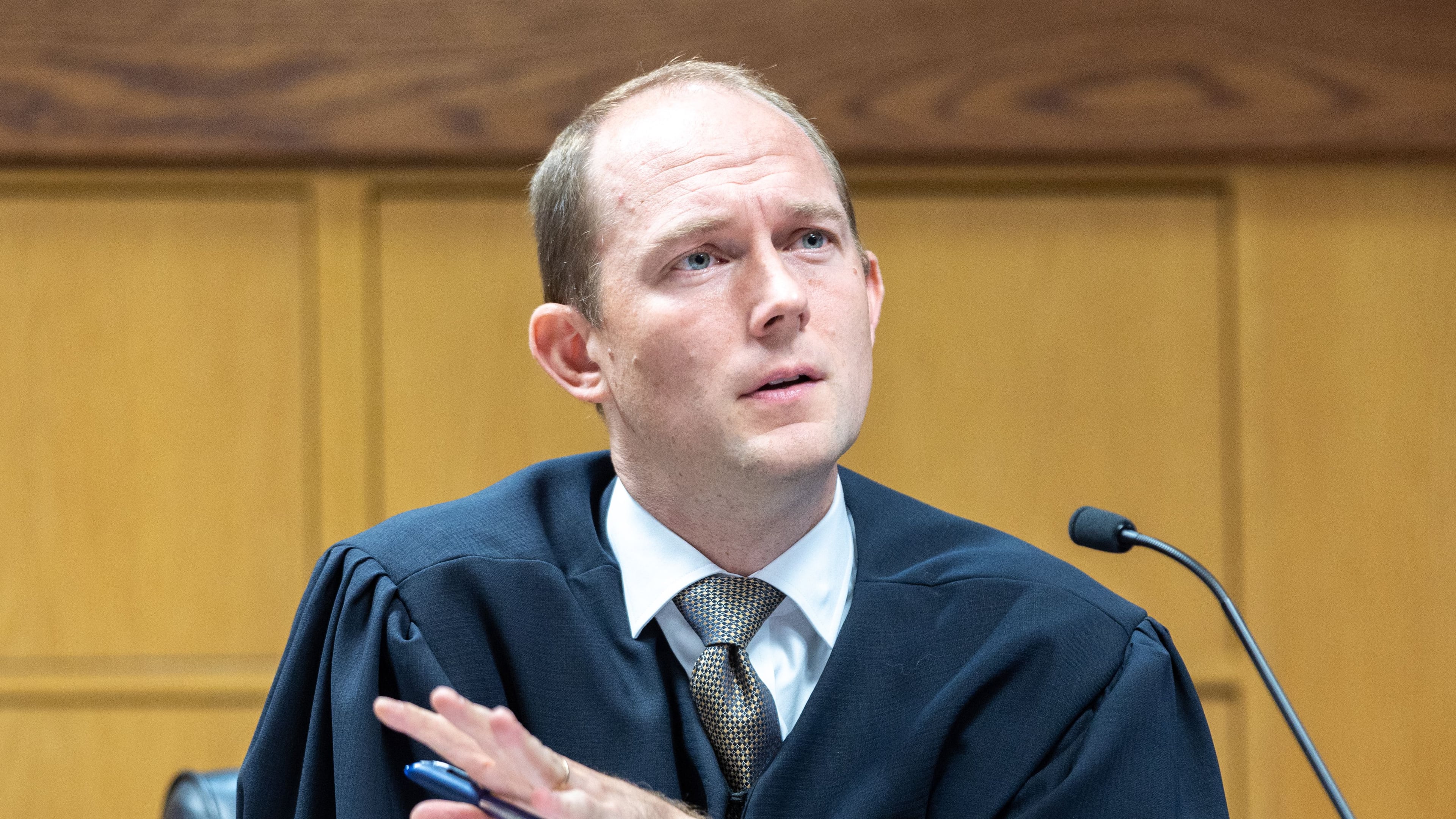Georgia judge strikes more counts in Trump election interference case

Fulton Superior Court Judge Scott McAfee on Thursday struck three additional counts from the year-old indictment that alleged former President Donald Trump and more than a dozen others were involved in a felony conspiracy to overturn Georgia’s 2020 election results.
McAfee concluded the criminal conduct described in the felony counts, which all involve alleged false statements made to a federal court, “lie beyond this state’s jurisdiction” under the U.S. Constitution’s Supremacy Clause and must be removed. Trump was originally charged with two of those counts.
For now, McAfee’s order affects only two of the 15 remaining defendants in the case, attorney John Eastman and state Sen. Shawn Still. But the judge’s findings would eventually apply to the other defendants charged of those counts, including Trump, once the Georgia Court of Appeals lifts a stay impacting the bulk of the case.
The stay was put in place this summer after a three-judge panel said it would consider a request to remove Fulton District Attorney Fani Willis from the case due to an alleged conflict of interest. The order has frozen the bulk of the case in the lead up to oral argument on Dec. 5. The appeals court is not expected to issue a ruling until early next year, and the losing side is likely to appeal that decision.
There are now 32 remaining felony counts in the indictment. Trump is facing eight felony counts, down from the 13 originally filed against him.
Steve Sadow, Trump’s lead Atlanta attorney, said Thursday, “President Trump and his legal team in Georgia have prevailed once again.” Willis spokesman Jeff DiSantis said prosecutors are currently reviewing the order and declined to comment further.
Here’s more about the three counts that were nixed:
- Count 14 (Criminal attempt to commit filing false documents) — Alleged that Georgia GOP activists Still, David Shafer and Cathy Latham mailed a document to the chief judge of U.S. District Court in the Northern District of Georgia in December 2020 making the “materially false statement” that they were duly elected and qualified electors from Georgia, even though Democrat Joe Biden had been declared the winner of Georgia
- Count 15 (Conspiracy to commit filing false documents) — Alleged that Trump; campaign aide Michael Roman; and attorneys Eastman, Rudy Giuliani, Ray Smith and Bob Cheeley mailed a certificate to a federal judge in December 2020 making the “materially false statement” that it contained votes from duly qualified Republican electors from Georgia
- Count 27 (Filing false documents) — Alleged Trump and Eastman made a series of false statements in an emergency injunction filed in December 2020 as they sought to challenge Georgia’s election results in federal court. Among them: that tens of thousands of felons, dead people and underage people had voted in Georgia and that officials had used misinformation to send the press and GOP poll watchers home from State Farm Arena on election night
McAfee wrote that federal laws provide a way to enforce against false statements made under oath in judicial proceedings.
“As a result, Georgia does not have a ‘legitimate interest’ and jurisdiction to punish such statements,” McAfee wrote.
Prosecutors can appeal McAfee’s decision. Such a challenge would go directly to the Georgia Supreme Court, since it involves constitutional issues.
Trump investigation in Georgia
The Fulton County investigation into alleged election meddling is a massive story the AJC has been telling since Election Night 2020. Reporters Bill Rankin, Tamar Hallerman and editor Shannon McCaffrey anchor the coverage. Readers will find updates on the case across all of our platforms, including AJC.com, print and ePaper editions and in podcasts.
Sign up for our special newsletter with Trump Georgia case updates
Episodes from the Breakdown Podcast: The Trump Indictment
Episodes of the Politically Georgia Podcast
Judge allows Trump, others to appeal Fani Willis removal ruling; Judge Scott McAfee says he’ll continue work on other aspects of case. Georgia appeals court sets Oct. 2024 hearing.
Meet the Georgia judges who will hear appeal of challenge to DA Fani Willis
In a separate order also issued Thursday, McAfee left intact the bedrock count of the case, felony racketeering. Defendants had argued that prosecutors did not show enough continuity to the alleged pattern of racketeering activity or enough of a connection between the alleged criminal enterprise and the criminal activity charged in the indictment. They had also said the indictment and Georgia’s RICO statute itself were overly vague.
McAfee ruled that the racketeering count “is facially sound and constitutionally sufficient as alleged.”
The twin decisions come six months after McAfee killed another six of the 41 original counts from the indictment, saying they lacked sufficient detail. The DA’s office has appealed that ruling — which impacts Trump, Giuliani, Eastman, Smith, Cheeley and former White House Chief of Staff Mark Meadows — to the Court of Appeals.
Regarding McAfee’s ruling on the Supremacy Clause, Georgia State University Law Professor Anthony Michael Kreis called the question “one of those close cases where reasonable legal minds can disagree.”
“This was always a difficult matter because there is no federal law that necessarily preempts the ability of states to prosecute individuals for misstatements to federal authorities that have a direct relationship to state election law processes, especially when those statements relate to false assertions that are tantamount to impersonating a state official.”
He added, “At the same, it’s highly unusual for a state prosecutor to charge someone for unlawful statements made to the federal government. There’s a strong viewpoint that the state shouldn’t be able to criminalize conduct within the federal system because it potentially interferes with national affairs.”
While McAfee’s ruling is limited to the defendants in this case, one observer noted that defendants in other cases who are indicted under the same statute could try and cite the ruling.



